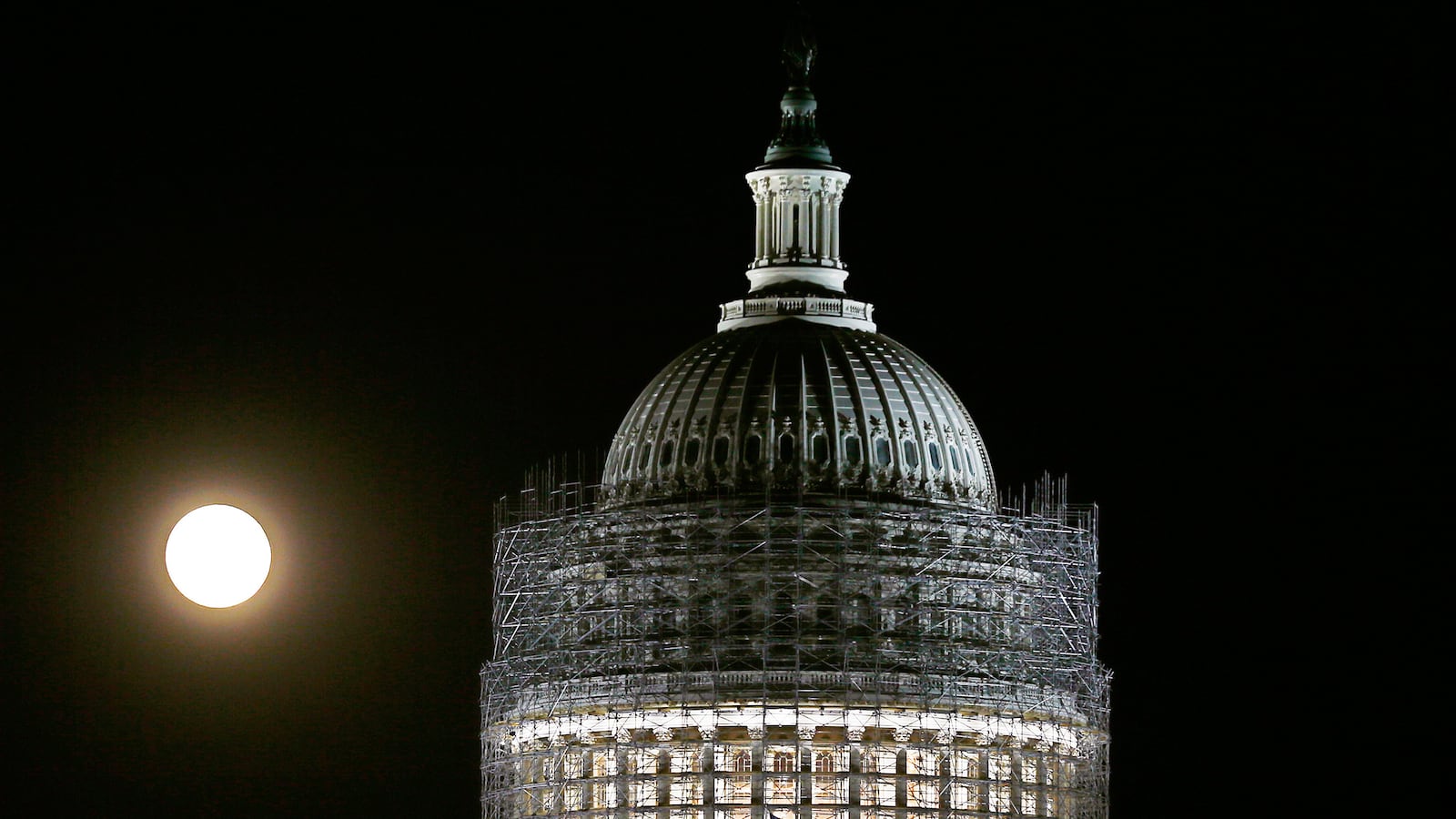So the experts say a government shutdown next week over funding for Planned Parenthood is “very likely.”
Here’s something they’re not telling you: This sort of disruption is going to become the new normal, regardless of what party controls the House, the Senate, and the presidency and what you think about abortion, Obamacare, White House Poetry Night, and any other issue on which opinions are sharply divided. That should give pause even to libertarians such as myself who kinda-sorta love the idea of government shutdowns. It’s not a sign that the country is moving toward smaller, more limited government. It’s a sign that the system is breaking down at the exact moment we need to confront massive, looming problems with runaway debt, defense spending, old-age entitlements, and more.
Political Realism: How Hacks, Machines, Big Money, and Back-Room Deals Can Strengthen American Democracy, a new book by the Brookings Institution’s Jonathan Rauch, argues provocatively that well-meaning reforms and developments championed by libertarians, progressives, and populists have effectively destroyed the ability of political parties to control their members or even select candidates for office.
The end of earmarks, for instance, has meant that House and Senate leaders have no way of buying off recalcitrant legislators to make a tough vote with a (relatively) cheap local project. Transparency laws make it difficult for politicians to fully lay their cards on the table and reach productive compromises. Citizens United and other decisions have allowed unlimited amounts of money to flow to political action committees (PACs) while still sharply limiting the amount that parties and individual candidates can raise. The net effect is that national legislators are beholden not to party leaders but to outside groups whose parochial interests run rampant.
Rauch is no simple-minded good-government type who measures “progress” by the number of laws passed or sees mushy-middle compromise as the ideal. “Sometimes things don’t get done because there’s no consensus and people don’t know what to do. Fixing Medicare, that’s really hard; no one knows what to do,” he told me in a recent interview. “The problem is when you have a consensus, when you have a plan, when both parties want to get the thing done, and despite the fact that a majority of members of both parties in Congress and the president want to get it done, it still doesn’t get done.”
For Rauch, Donald Trump’s campaign success illustrates his point. Two decades ago, when a different billionaire, H. Ross Perot, wanted to run for president, he had to do so an independent. Nowadays, largely because of rule changes that limit the power of the GOP to control access to its own ballot, Donald Trump is running first as a Republican (a party he only recently joined).
The same fundamental loss of power is at play at congressional levels, too. “What happens,” asks Rauch, “when John Boehner tries to get the votes together to keep the government open, for example, or pass an immigration bill, which he would have liked to have done, and he can’t get anyone to do it because all his guys are more afraid of the shadow PACs, the super PACs, and the outside money than they are of him?”
A fierce defender of free speech and a pragmatist, Rauch knows there is no way of getting money out of politics. Instead, he argues, let parties and candidates raise unlimited money, just like the PACs can. Parties, he says, are large organizations and less susceptible to wholesale capture by groups whose funders aren’t even known. Parties are “more accountable than anyone else,” says Rauch. “They can move that money around and begin to use it as an incentive. They can tell a member, ‘Look, if you vote for this Medicare cut, we’re gonna help you in your race, and we have the money to do it.’”
I should confess that as a libertarian, I’ve got no philosophical problems with government shutdowns even. If anything, I welcome them (even though I think abortion should be legal). If the doctor’s creed is “First, do no harm,” then the government’s should be “First, do no more harm,” and unscheduled vacations help accomplish that goal for as long as they last. Indeed, for all the teeth-gnashing and garment-rending over 2013’s two-week-long federal siesta, the plain fact is that nothing important went undone, even as 95 percent of Department of Education workers were revealed to be literally “non-essential.”
And I’m not fully convinced by Rauch that the problem is systemic rather than personality-based. John Boehner is a speaker of the House who inspires nothing but derision. As a friend of mine once put it, “Boehner is the type of guy who couldn’t get laid in a monkey whorehouse with a handful of bananas.” Indeed, just weeks before assuming the speakership in 2011—after years in Congress, ostensibly as a small-government, budget-slashing conservative and after a massive, Tea Party-driven takeover of Congress—Boehner was asked by NBC’s Brian Williams to name a government program the nation could do without. “I don't think I have one off the top of my head,” he replied lamely. Senate Majority Leader Mitch McConnell is similarly uncharismatic, too. Perhaps with different folks in charge, congressional Republicans would be throwing fewer hissy fits at their own leadership and passing more spending cuts.
And there’s no question, too, that the gridlock ushered in by the 2010 elections reduced government spending, at least in the short term. As Mercatus Center economist Veronique de Rugy has documented, after peaking in 2010, real per capita spending dropped for three straight years. It’s risen in fiscal 2015 but is still below where it was in 2009, the single-biggest spending year in the country’s history.
But short-term wins can yield to long-term disasters. Most of the federal budget is automatic, with about 70 percent of spending already going to “mandatory” programs such as Medicare and Social Security and interest on the federal debt. That sort of spending, which isn’t affected by government shutdowns, will continue to increase over the next few decades until it accounts for virtually all outlays. Without the sorts of major reforms that are impossible under current political conditions, we can only expect massively higher taxes and sharply reduced benefits as the bill for decades of “Government by Groupon” finally comes due.
“We’re lucky [if] we get one big reform in a decade,” says Rauch. “In the 2000s it would have been Social Security reform, if we hadn’t entered the zone of paralysis. Now, it would have been immigration reform. The next one needs to be entitlement reform.”
And he pours this acid bath specifically over the pretensions of libertarians that, to me at least, burns away any enjoyment I might take from next week’s government shutdown—and the one after that, and the one after that: “Libertarians forget that the winds are generally—socially, economically—in their favor,” Rauch counsels. “What really happens if Congress does nothing is power flows to the president, who does what he damn well pleases.”






